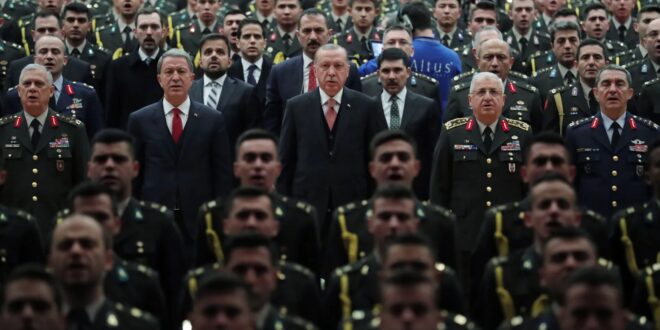Since his sweeping overhaul of Turkey’s political system in 2017, President Recep Tayyip Erdogan has cemented his near-total control over the country, even if he has undermined the country’s democracy to do so. Under his increasingly authoritarian rule, dissent has become more and more dangerous, with numerous opposition leaders, civil society figures and journalists having been arrested on what most observers consider to be politically motivated charges.
Is Erdogan’s Era of Dominance Coming to a Close?
Last year, however, the combination of a tail-spinning economy, a disastrous emergency response to the February 2023 earthquakes and a united political opposition seemed to present Erdogan with his greatest electoral challenge in his 20 years in power. He ended up winning May’s presidential election handily, and his coalition government maintained control of parliament. But recent municipal elections, in which his ruling Justice and Development party suffered stinging losses, suggest that Erdogan’s era of dominance could be coming to a close.
Turkey’s Bellicose Foreign Policy
For the past decade, Erdogan has also pursued an adventurous and bellicose foreign policy across the Mediterranean region, putting Ankara increasingly at odds with its NATO allies. After Turkey’s purchase of a Russian air-defense system in July 2019, Washington suspended Turkish involvement in the F-35 next-generation fighter plane program. Turkey’s repeated incursions into waters in the Eastern Mediterranean claimed by Cyprus, as well as its standoffs with Greek and French naval vessels in the region, further raised tensions and alarmed observers. And Ankara’s support for political Islamists since the Arab uprisings as well as its role in the Middle East’s various armed conflicts have put it at odds with the Gulf states and Egypt.
At Odds With Russia
Turkey’s involvement in Syria’s civil war increased Ankara’s leverage there, but at times pitted Erdogan against Russian President Vladimir Putin in the military and diplomatic competition to shape the end game of that conflict. Its involvement in the Libyan civil war on behalf of the United Nations-recognized Government of National Accord similarly put Turkey at odds with both Russia, which supports the forces of Gen. Khalifa Haftar, and Ankara’s European partners, which had sought to enforce an arms embargo on the country. Most recently, Turkey’s political and military support for Azerbaijan in its 2020 war with Armenia over the breakaway Nagorno-Karabakh region once again put it at the heart of a conflict with direct implications for Russia’s national security interests. Nevertheless, Erdogan has managed to maintain open channels of communication with Putin that he has tried to leverage into a mediating role in the war in Ukraine, at times with some success, as with the Black Sea Grain Initiative.
Tensions Between Turkey, the US and Europe
Since his reelection last year, Erdogan has signaled yet another foreign policy reset, adopting a more conciliatory posture toward Turkey’s NATO allies and European partners. The Russian invasion of Ukraine seemed to add urgency to that effort, but that hasn’t stopped Erdogan from playing a game of brinksmanship to gain concessions from Sweden in return for unblocking its membership applications to NATO. And none of the underlying causes of tension between Turkey and the U.S. and Europe have been resolved so far, meaning that a return to confrontation cannot be ruled out, especially if it ever serves Erdogan’s domestic political interests. As always with Erdogan, today’s thaw can easily transform into tomorrow’s confrontation, depending on his political needs of the moment.
A Weakened Erdogan Is Still Bad News for Turkey’s Democracy
Assuming his health holds out and that he does not pull a rabbit—in the form of a constitutional revision—out of his hat to award himself yet another term, Turkish President Recep Tayyip Erdogan will remain in office until 2028. Nevertheless, his political position seems more tenuous today than perhaps at any time since he survived a coup attempt in 2016. Erdogan’s domestic weakness is not likely to result in any “moderation” of his policies, however. To the contrary, the political drubbing that his ruling Justice and Development Party, or AKP, took in municipal elections in March is likely to result in greater attempts to consolidate power at home and sharper demonstrations of assertiveness abroad, at least in the short term.
Erdogan’s Strategy to Maintain Control
Erdogan has thus far not weaponized the courts against victorious opposition mayors as he did after the 2019 municipal elections. Erdogan’s Turkey is doubtless authoritarian, but Turks still believe their votes should matter, and rejecting their choices too blatantly would come with very high costs. Instead, Erdogan has taken a two-pronged approach, combining further repression of some opposition figures with structural reforms that shift power away from municipalities and toward the central government. The repression has focused on two longstanding hobgoblins of Turkish nationalist discourse: the Kurds and “foreign influence.”
Many elements of Turkish civil society rely heavily on Western financial support. A pending “foreign agents” bill similar to the one recently adopted in Georgia, if passed, would gut much of this work. It is likely to be coupled with further crackdowns on “progressive political movements” as Erdogan attempts to shore up his new weakness on the Islamist right. The secular opposition may have won significant victories in the March elections, but the country is likely to move rightward for the foreseeable future.
Does Erdogan Have a Succession Plan?
Looking ahead, a smooth transition to an anointed successor is no longer likely to be as seamless as Erdogan once might have hoped. Another option would be to push through a constitutional amendment that would allow Erdogan a chance for another term. But getting the necessary opposition support would be a steep climb and would require offering something in return. In the short term, Erdogan is focused on shoring up his base and returning to his tried and true authoritarian tools of vilification and punitive measures against perceived “enemies of the nation.” The road back from authoritarianism will be neither short nor easy.
 Eurasia Press & News
Eurasia Press & News



